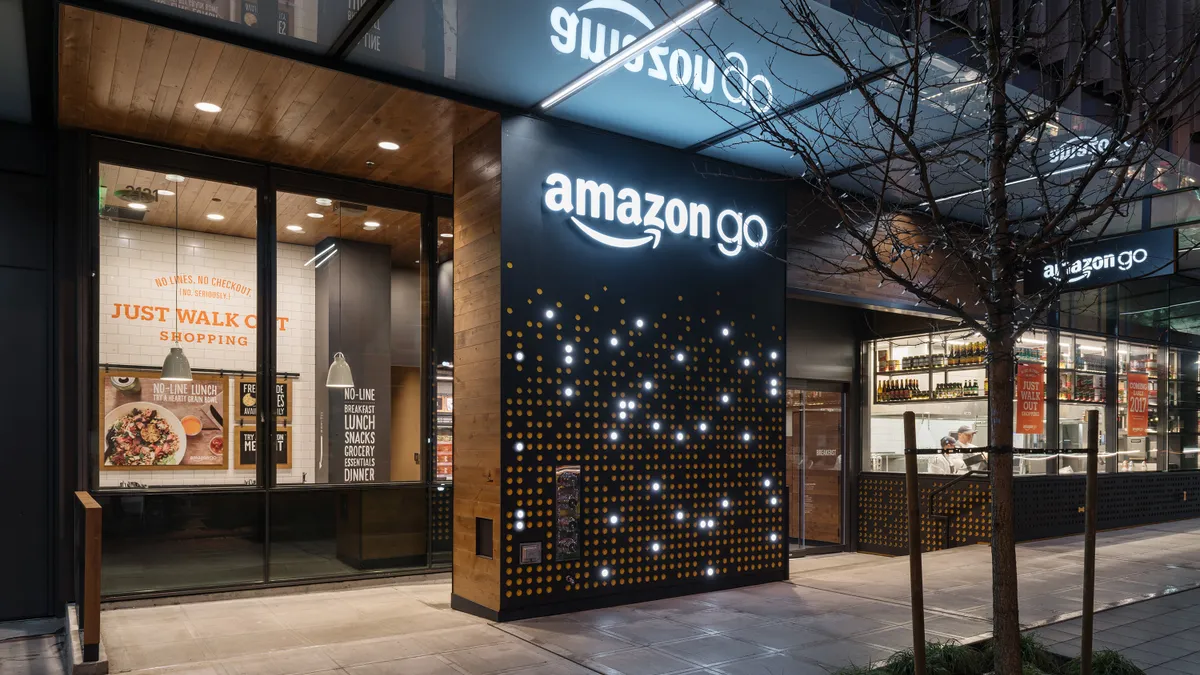Dive Brief:
-
Amazon is scrutinizing its expenses and scaling back unprofitable enterprises, much of that centered on its retail-related operations, including its Alexa virtual assistant, according to a report from the Wall Street Journal Thursday.
-
Employees in certain divisions have been told to seek jobs elsewhere, according to the report. The e-commerce giant last month reportedly froze corporate hiring in its retail business, later expanding that company-wide. Earlier this year company also pulled back on a planned warehouse expansion.
-
The economy is impacting the company’s decisions, Amazon spokesperson Brad Glasser said in an emailed statement. “We remain excited about the future of our larger businesses, as well as newer initiatives like Prime Video, Alexa, Grocery, Kuiper, Zoox, and Healthcare,” Glasser said. “Our senior leadership team regularly reviews our investment outlook and financial performance, including as part of our annual operating plan review, which occurs in the fall each year. As part of this year's review, we're of course taking into account the current macro-environment and considering opportunities to optimize costs.”
Dive Insight:
Amazon joins other big companies, especially in the tech sector, in moving assertively to contain costs during a moment of economic uncertainty. The company must also unwind some expansion plans it made as e-commerce surged during the height of the pandemic, only to quiet down as consumers returned to their more normal lifestyles.
The company increasingly derives its strongest revenue growth from advertising, subscriptions, logistics and its AWS cloud service rather than retail sales of goods. In late October, the company warned that profits could be as low as zero in the fourth quarter.
All companies in any industry should conduct cost reviews each year, regardless of the state of the economy, according to Forrester Principal Analyst Brendan Witcher.
“In fact, it’s a practice most retailers do, but because it’s Amazon it’s suddenly newsworthy,” he said by email. “The more important part of this story that folks should remember is that Amazon has rarely had a misstep in overreacting to short-term market conditions. While other retailers tend to shoot themselves in the foot by overreacting and having to recorrect again later, Amazon tends to make cost cutting moves that don’t put them in a position that they have to readjust the following year.”
The e-commerce giant is being shepherded by a chief executive, Andy Jassy, who took over from founder Jeff Bezos a little over a year ago. Jassy inherited a company that, thanks to a mindset of constant innovation and no fear of failure, has become a sprawling conglomerate in the last decade, according to GlobalData Managing Director Neil Saunders.
“This sort of thinking – which is the hallmark of Jeff Bezos – was to ensure that Amazon remained at the forefront of new trends by experimenting with different ideas that may become accretive to its business,” he said in emailed comments.
Jassy is keen to slash costs and prioritize profits, sources told the Wall Street Journal. That’s a necessary correction now that the economy is uncooperative. It’s also a complex endeavor because Amazon has grown so large and disparate, and because loss-makers like Alexa are important to Amazon’s successful ecosystem, Saunders said.
“This means cutting must be done with surgical precision rather than by taking a hatchet to the business,” he said. “Amazon must also take care to ensure it doesn’t stifle the spirit of innovation which has, for a long time, allowed it to advance in areas like retail. In our view, once the review process is concluded Amazon would benefit from setting out a clear plan for how it intends to grow to show investors it has a good sense of future direction that goes beyond trying to cut its way to profitability.”














